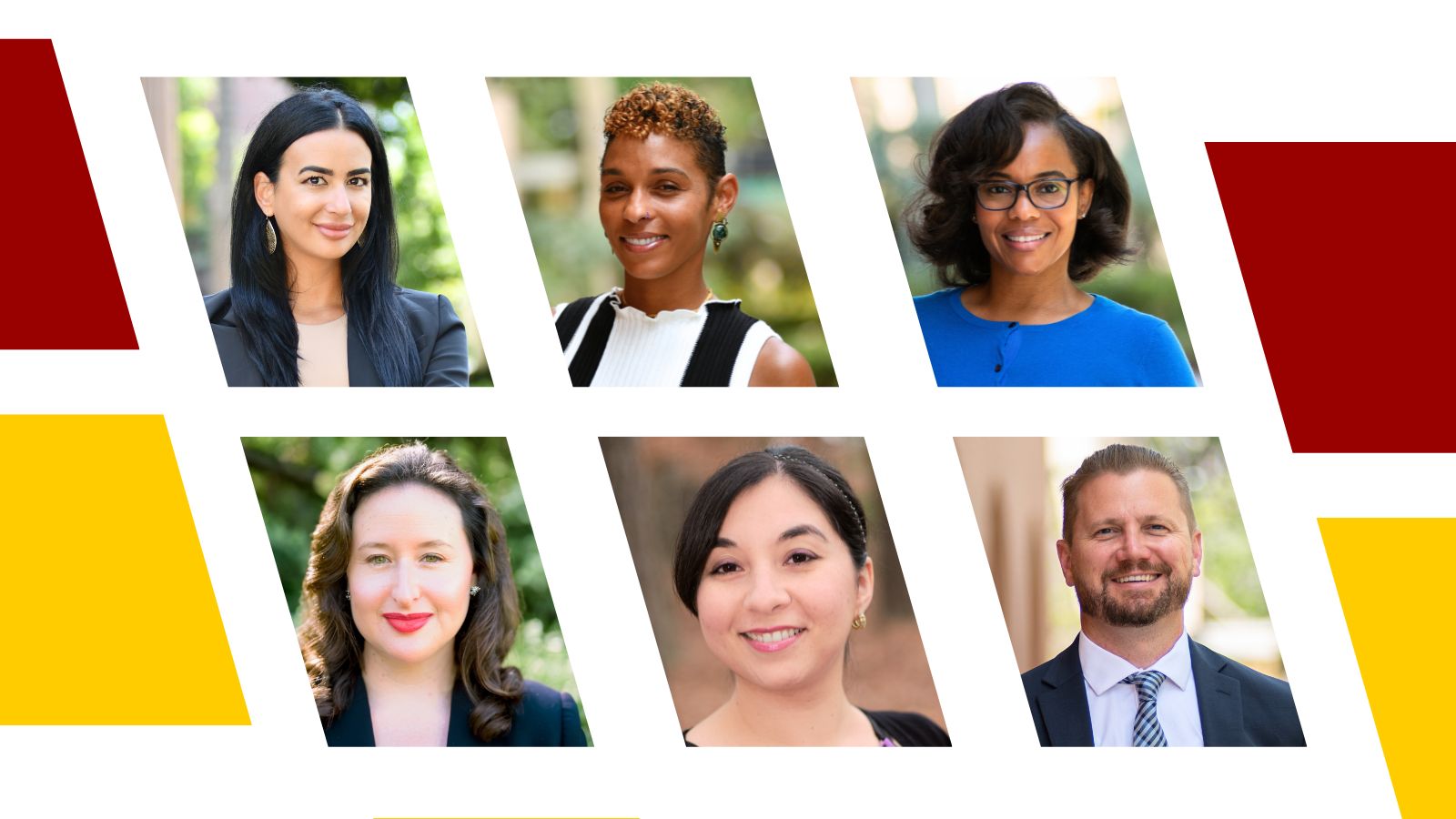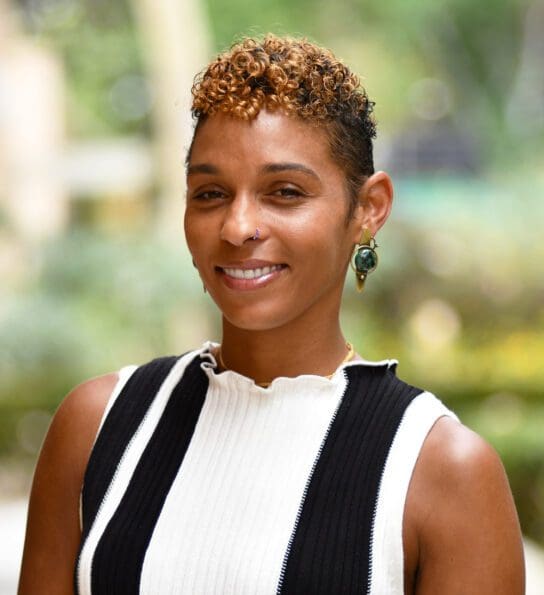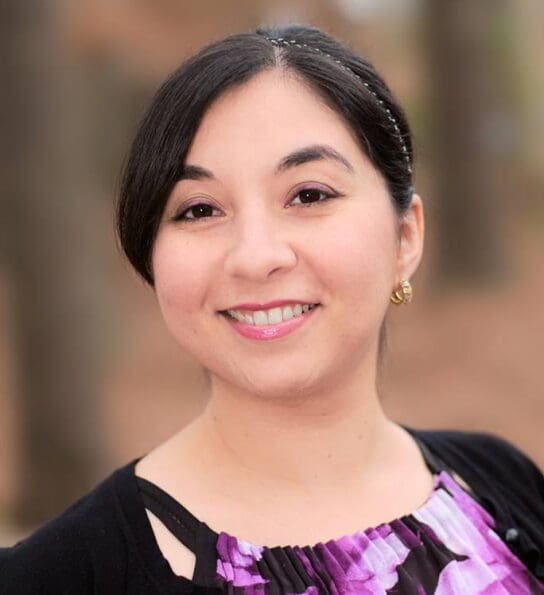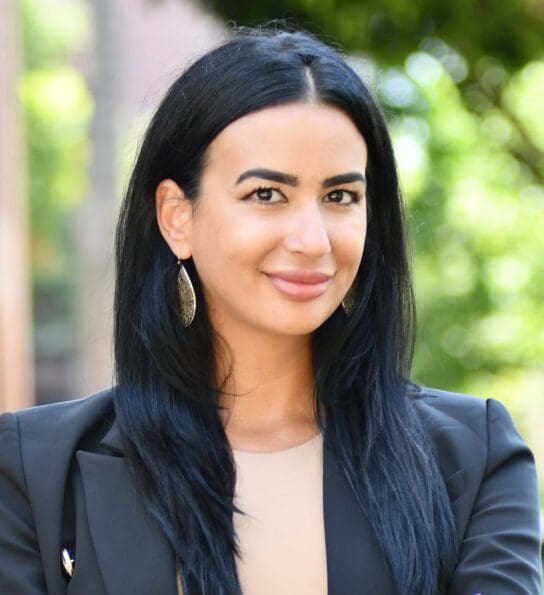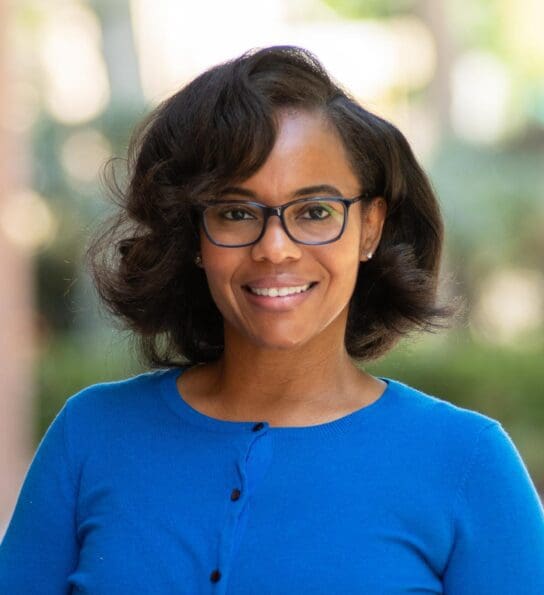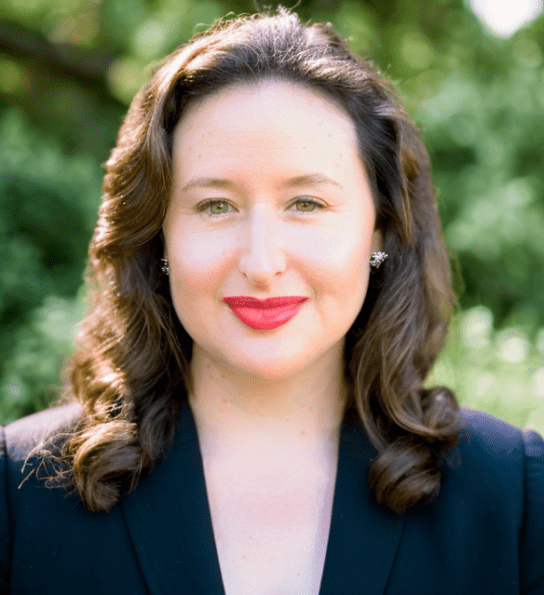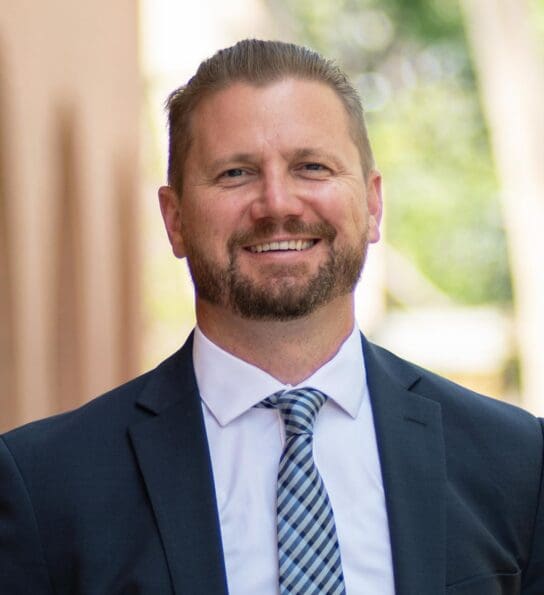Lauren Brown
Assistant Professor of Gerontology;
Edward L. Schneider, MD Chair in Gerontological Research
Q: What is the focus of your research?
A: My research uses publicly available data with the goal of understanding the unique difficulties Black Americans face in maintaining physical and psychological well-being as they age. Focusing on the complex interplay between stress and health, my work aims to more accurately depict the aging experience of Black Americans and how it may be different than dominant aging paradigms. While my work details the stress, racism, structural discrimination, and inequity that Black older adults have experienced, that is only part of the story. I also place emphasis on the coping, agency, strengths, resistance, joy and rest that are part of the Black American experience. I aim to share untold stories about the heterogeneity in Black aging that avoid the tropes of deficit thinking: “Blacks look worse than whites on [insert aging outcome here.]” And I aim to share untold stories of Black aging that do not conceptualize resilience, agency and other strengths as individual personality traits rather than community resources cultivated in response to stress, racism, and life in the US.
I am also the Founder of Linked Fate Data Collective, a data science lab for scholars, scientists, activists, organizers, and students working in unison for the greater purpose of data equity. We utilize publicly available, community-based and opensource data to expose injustice through data and storytelling. Our data projects aim to more accurately represent the diversity within our communities to reject oversimplified scholarship and establishing equitable practices for collecting, disseminating and visualizing data. A larger thread of this work is acknowledging and disrupting the power dynamics in the (academic) research enterprise that exclude, harm, extract or discard Black older adults in the process of data collection. All of which often then impacts analyses, interpretation of findings and the utility of the research for Black aging communities in the US.
Q: What brought you to the USC Leonard Davis School?
A: Los Angeles is home for me. I am originally from the Inland Empire but I have lived in South LA for 15 years now. I played soccer at USC as an undergraduate and got my PhD here in the school of Gero in 2018. I think we have one of the most unique environments at the school of gerontology. I loved my coursework here and Its lovely to be back. I am also here to support older adults and the aging community in South Central and greater LA area. I am actively searching for ways to meaningfully support community-based and grassroots organizations and activists that are the unsung heroes of social justice and health equity work in Los Angeles.
Q: What is your favorite part of teaching or favorite subject material to teach?
A: “The classroom remains the most radical space of possibility in the academy”- bell hooks
Teaching is such a beautiful and rewarding part of this job. The classroom is a space of creativity for me, but I always insist that the creativity not stay within the confines of the classroom. This role is sacred to me because I feel like it is my role to connect students to diverse ideas and perspectives, teaching them to sharpen and trust their skillsets, and then empower them to launch their own intellectual journeys. I really thrive teaching beginner statistics courses, health care and research ethics courses and stress and sociology of aging classes, with a particular emphasis on social justice and quantitative methodology.
Q: What’s the best thing you’ve learned as you’ve gotten older?
A: I am constantly relearning ways to decentralize capitalistic ideas about endless productivity…. productivity is a trap. “Rest is Resistance” (see Tricia Hersey’s work for more on these ideas). Becoming more efficient just makes more room to fill up my day with more to-do’s. I’m realizing the goals of productivity are not work-life balance but just more work! The day will never arrive when my inbox is at zero or when my to-do list(s) are done. There is no finish line to the work I aim to do in this lifetime so it is important I pace myself so I can enjoy all this life has to offer. I keep reminding myself rest is a productive activity since it allows me to come back to my work and be present.
Q: What is your favorite hobby or pastime?
A: Using my little space/land that I have access to grow things and spending time with my family,
My two cats: Egypt and Puma and my dog Detroit.
Currently listening to Cleo Soul & How to survive the end of the world (podcast)
Currently reading: “How to go mad without losing your mind” by La Marr Jurelle Bruce
Fav restaurant in LA right now: Baba Vegan and Crystals Soul Cafe
Fav LA bookstores: Reparations Club & The Salt Eaters
Constanza Cortes
Assistant Professor of Gerontology
Q: What is the focus of your research?
A: We focus on understanding why exercise is good for the brain, and how it can be used to help prevent or delay the onset of age-associated cognitive decline and Alzheimer’s Disease
Q: What brought you to the USC Leonard Davis School?
A: The critical mass of geroscience-focused research, and the possibility of joining a world-class environment with experts in any translational and socio-economic areas of aging. Research cannot happen in a vacuum!
Q: What is your favorite part of teaching or favorite subject material to teach?
A: Scientific/critical thinking. Being a scientist means always asking ‘why’ and ‘how’, and seeing students develop those skills and begin to question facts they are given is one of the most rewarding aspects of my job.
Q: What’s the best thing you’ve learned as you’ve gotten older?
A: Patience and kindness, for myself and for others.
Q: What is your favorite hobby or pastime?
A: I am a salsa and bachata dancer.
Francesca Falzarano
Assistant Professor of Gerontology
Q: What is the focus of your research?
A: My research is a direct culmination of my own experiences after my mother was diagnosed with dementia when I was only 14 years old. I have since worked to build a program of research focused on bridging psychology and technology to identify the individual, contextual, and psychosocial factors contributing to heterogeneity in the experiences of dementia family caregivers. My work specifically applies principles of developmental science to better understand the differential impacts of care-related stress on psychosocial outcomes across the dementia caregiving trajectory, ranging from diagnosis, progression, to death and bereavement. A major throughline of my work explores how technology could be leveraged to develop targeted behavioral interventions to better support the mental health and well-being of dementia family caregivers.
Q: What brought you to the USC Leonard Davis School?
A: I feel so lucky to be a part of an entire School of Gerontology. USC Leonard Davis School’s nationally recognized reputation for conducting innovative, cutting-edge cross-disciplinary research is only one of many reasons that brought me here. The Leonard Davis School’s significant contribution to amplifying the field of Gerontology makes me so grateful to have the opportunity to learn from leading experts that I can now call my colleagues. Also – as a lifelong New Yorker, the California weather isn’t bad either!
Q: What is your favorite part of teaching or favorite subject material to teach?
A: I love to teach about the integration of user-centered design principles and behavioral research involved in the development and testing of technological tools that are tailored to older adults’ varying mobility, functional, and cognitive capabilities and designed to support their psychosocial well-being. It is a surprisingly interdisciplinary field that bridges a continuum of knowledge across gerontology, technology, and psychology to inform the design of useful and usable technologies for older adults.
Q: What’s the best thing you’ve learned as you’ve gotten older?
A: I recently came across this quote by Mary Anne Radmacher that sums it up better than I can: “Courage doesn’t always roar. Sometimes courage is a quiet voice at the end of the day saying, ‘I will try again tomorrow.’”
Q: What is your favorite hobby or pastime?
A: All things movement! Running, cycling, hiking – I love to be active, get outside, and break a sweat!
Cristal Hill
Assistant Professor of Gerontology
Q: What is the focus of your research?
A: In general, diets that either reduce caloric (CR) intake or alter the intake of amino acids, including dietary protein restriction (DPR) are reported to reduce the risks of age-related diseases and obesity. The central focus of the Hill lab is to determine the impact of dietary protein on cellular and molecular adaptation within adipose tissue (i.e., body fat) during aging.
Q: What brought you to the USC Leonard Davis School?
A: There are several reasons that led me to consider the Leonard Davis School of Gerontology, however the main reason is the collaborative research environment across the campus and to contribute something greater than myself.
Q: What is your favorite part of teaching or favorite subject material to teach?
A: My favorite part of teaching is observing the eagerness and curiosity of students, especially when the subject/topic is new to them.
Q: What’s the best thing you’ve learned as you’ve gotten older?
A: Don’t sweat the small stuff! I learned to seek my purpose during grad school. Like this, I feel that moving with purpose and faith reassures me to support my husband, family/friends, and for the betterment of mankind.
Q: What is your favorite hobby or pastime?
A: Gardening and tending to house plants. This hobby always sparks happy memories of spending time with my grandmother.
Michelle Keller
Assistant Professor of Gerontology;
Leonard and Sophie Davis Early Career Endowed Chair in Minority Aging
Q: What is the focus of your research?
A: My research focuses on designing and testing interventions to reduce potentially inappropriate medications and treatments in older adults. I also work closely with clinicians and health system leaders to design interventions that ensure that older adults, particularly underserved populations, are receiving high value health care.
Q: What brought you to the USC Leonard Davis School?
A: I’m really excited to collaborate with our amazing faculty and students to improve the health of older adults. What I’m particularly excited about is the multidisciplinary aspect of the school, which allows for collaborations between basic or bench scientists and social scientists.
Q: What is your favorite part of teaching or favorite subject material to teach?
A: I love teaching about health policy, as it is an incredibly dynamic topic. Our health system is constantly changing and touches all of us, so I enjoy discussing policy changes with students and engaging them on how these changes affect our ability to access and pay for healthcare.
Q: What’s the best thing you’ve learned as you’ve gotten older?
A: As we get older, our adverse experiences can help us become more empathetic and understanding towards others. We can develop broader perspectives, allowing us to relate to different perspectives.
Q: What is your favorite hobby or pastime?
A: I love paddleboarding! I find it to be a meditative activity. When I’m out on the water, it’s hard to think about other things or else I lose my balance and fall into the water!
Daniel Nation
Professor of Gerontology and Medicine;
Merle H. Bensinger Professorship in Gerontology
Q: What is the focus of your research?
A: My research focuses on vascular changes contributing to cognitive decline and dementia in older adults. In particular, I am interested in the hypothesis that increased cerebrovascular resistance and blood-brain barrier permeability drive neurodegeneration and cognitive impairment, particularly in those at genetic risk for Alzheimer’s disease. My work aims to elucidate this process and to develop and refine neuroimaging and biofluid markers of these pathophysiological changes, which will ultimately inform therapeutic efforts.
Q: What brought you to the USC Leonard Davis School?
A: As one of the premier institutions of aging research in the world, the school is an ideal place to conduct research, collaborate and share ideas, and train the next generation of scientists and professionals in the field of aging.
Q: What is your favorite part of teaching or favorite subject material to teach?
A: I most enjoy teaching students about the different neurocognitive disorders of aging, including the neuropsychology, neuroscience and neuropathology of these diseases. I find it rewarding to give students a holistic perspective on these disorders and to share stories from my experiences with patients and their families.
Q: What’s the best thing you’ve learned as you’ve gotten older?
A: Youth is wasted on the young.
Q: What is your favorite hobby or pastime?
A: Surfing.

